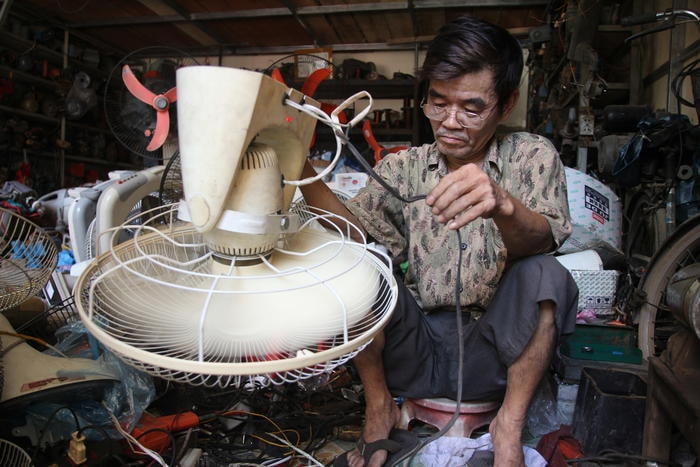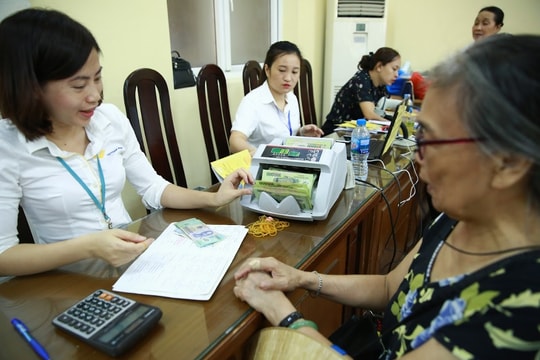Retired but not retired
(Baonghean) - Along with the needs of society, many retirees still decide to choose to go to work. Their participation contributes to creating a fairly large labor force that some people jokingly say is "retirees who do not quit their jobs".
In the past 3-4 years, in Vinh City, it is not difficult to see retirees doing extra jobs mainly to increase their income on top of their meager pension. The options for part-time jobs for retirees can be divided into 2 types: freelance or working for a private company.
 |
| Working as a security guard for businesses and stores is a job many people choose after retirement. Photo: Chu Thanh |
Among the freelance workers at the foot of Cua Tien Bridge, there are some who have retired but still decide to continue working part-time due to family circumstances. Mr. Tran Nguyen The (born in 1958) said, “Workers’ salaries are only a pittance, so I asked for early retirement to work part-time to earn some money. There are 6 mouths in the house to feed an old mother, 3 children are in school, so how can the pension be enough?”
After retiring, with some savings from his salary, Mr. The borrowed money from his relatives to buy a car, and he could transport whatever he wanted. "Workers don't retire, they can only do it when they are bedridden, but as long as they are healthy, they have to keep working to take care of their children's education, and save any extra money for when they get sick in old age," Mr. The shared.
Mr. Hoang Dung Xich, 64 years old, chose to return to farming and work as a motorbike taxi driver at the intersection of Le Hong Phong - Nguyen Duc Canh (Vinh City). Mr. Xich confided that his pension of more than a million VND is not enough to live on, so he has to work extra to support the few mouths at home. "At 8 am, I drive from Nghi Van (Nghi Loc) to Vinh, and return home at 5 pm. On busy days, I earn a hundred VND, on slow days, I earn 20-30 tens of thousands. If my wife can prepare in time, she brings lunch, otherwise she goes to the nearby market to order a 15,000 VND portion to finish the meal," said Mr. Xich.
 |
| Mr. Hoang Dung Xich takes advantage of the opportunity to drive a motorbike taxi to earn extra income. Photo: Chu Thanh |
Unlike Mr. Xich who chose to work as a freelancer, after retiring, Mr. Nguyen Quang Vinh (58 years old) "joined" a famous security company with 500 - 600 employees in the city. Mr. Vinh honestly said: "Since retiring, I have been working as a security guard for about 4 years. Retiring at home makes me feel bored. Also, I want to earn more money for my children's education, so I listened to my friends' invitation to work as a security guard and went. Working at the company seems quite suitable for me, especially when more than half of the company's members are around the same age as me."
 |
| A retired engineer works repairing household appliances in the Vinh market area. Photo: Chu Thanh |
The work depends on the location and the employer. For example, at schools, you patrol and protect the facilities, while at restaurants and clothing stores, you just need to arrange and watch the vehicles for customers. On average, you can earn 3-4 million VND per month, not including food and drink. Although the job is easy, you still have to be on duty at the workplace all the time, so it is not difficult to see people having quick meals on the sidewalk, rain or shine.
“Sometimes, while eating, we have to keep an eye on the vehicles. When customers come or go, we put down our chopsticks and go to push the vehicles for them. But retiring “again” will probably have to wait a few years until our eyes and legs are tired and we will think about it later.” With low pensions and rising prices, people like Mr. Vinh and Mr. Xich all think that they should try to “get by and then think about it later.”
| The issue of retirees still having to work is not only a problem in Vietnam but also a headache for many developed countries with high rates of aging populations like Japan. According to 2016 statistics from the Organization for Economic Cooperation and Development (OECD), Japan has about 23% of its elderly population still working, the highest rate among the G7 developed countries, even higher than the US at 19%. In order to keep their jobs or have extra money to cover their living expenses beyond their pensions, many elderly people in Japan have to endure unfair treatment, even exploitation. |
Chu Thanh








